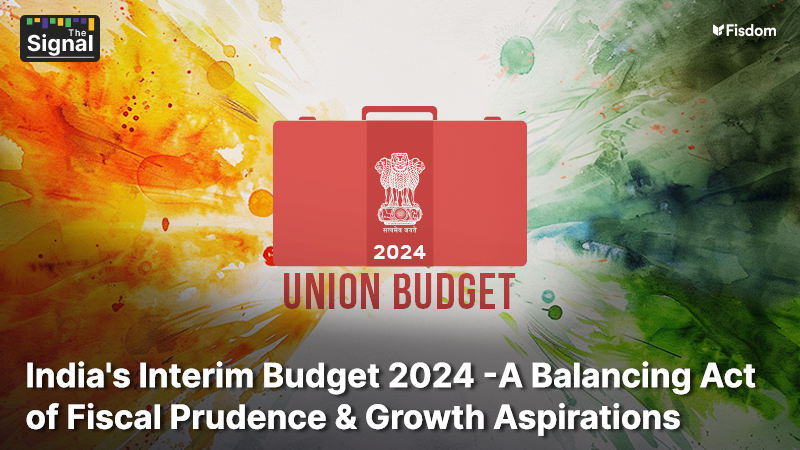
The Union Budget presented by Finance Minister Nirmala Sitharaman serves as a nuanced and strategic move by the government, defying the expectations of a pre-election populist budget. The speech was meticulously crafted to address a broad spectrum of stakeholders, from farmers to the youth and weaker sections to entrepreneurs. In the context of being an interim budget, it aimed to signal the government’s priorities and financial acumen with not opting for any extravagant spendings.
Key Highlights:
- Focusing on fiscal consolidation: The FY24 deficit was revised to 5.8% of GDP, surpassing the expected 5.9%. Remarkably, the deficit target stays at 5.1%, surpassing industry forecasts, and sparking positive reactions.
- Capex Increased: Government to boost capex to 11.1 trillion in FY25 expanded by 11.1% from Rs.10 trillion budgeted for FY24. It is a significant growth because we saw a 33% jump last year.
- The spending mix sees enhancement: The Revenue Expenditure to Capital Expenditure ratio drops to 3.29% from FY24 revised estimates of 3.73%, down from around 7.0% in FY20. This decrease signifies an improved spending mix.
- The assumptions regarding revenue receipts appear largely realistic, reflecting the anticipated nominal growth for FY25 (10.5%). Gross tax collections are projected to increase by 11.7% in FY25, up from 10.8% in FY24 Revised Estimates.
- No change in taxes: Taxes for direct and indirect taxes are retained.
- Borrowings: The FY25 Budget sets net borrowings at Rs 11.7 trillion. There’s a continued reliance on small savings for both FY24 and FY25, which could be seen as an optimistic assumption.
Fiscal Prudence and Credibility: One of the standout features of this budget is the commitment to fiscal discipline. Finance Minister Sitharaman has maintained the government’s promise of reducing the fiscal deficit, projecting a significant cut from 5.8% of GDP in the revised estimates for FY24 to 5.1% in FY25. This move sends a clear message to potential foreign investors, especially in the bond market, emphasizing India’s commitment to sound financial management. The bond markets reacted positively, reflecting confidence in the government’s credibility.
Investor-Friendly Measures: The focus on reducing the fiscal deficit is not only a signal to foreign investors but also a boon for domestic markets. Lower fiscal deficits typically lead to lower market interest rates, attracting long-term foreign fund inflows. This, coupled with the government’s commitment to infrastructure development, enhances confidence in India’s macroeconomic management.
Sectoral Boosts: While the budget covered a broad spectrum, key sectors stood out as potential beneficiaries. The infrastructure sector received a significant boost with an 11.1% increase in the capex target, reaching INR 11.1 lakh crore. The road and highway sector, in particular, saw increased allocations, signaling the government’s commitment to sustaining economic growth through robust infrastructure.
Sector wise performance of Indices on Budget Day:
| Name | Day Change % | No. of Companies | Advances | Declines | Advances/Declines Ratio | Month Change % | 1Yr Price Change % |
| Nifty PSU Bank | 3.11 | 12 | 12 | 0 | – | 13.2 | 61.4 |
| S&P BSE Energy | 0.01 | 28 | 15 | 13 | 1.15 | 12.2 | 41.5 |
| S&P BSE Telecom | -1.55 | 17 | 5 | 12 | 0.42 | 5.3 | 48.3 |
| BSE Cap Goods | -1.12 | 27 | 10 | 17 | 0.59 | 0.7 | 65.8 |
| BSE Realty Index | -1.05 | 10 | 2 | 8 | 0.25 | 8.2 | 104.2 |
| BSE Metal | -0.99 | 10 | 2 | 8 | 0.25 | -1.8 | 25.3 |
| S&P BSE Basic Materials | -0.91 | 188 | 49 | 138 | 0.36 | -0.6 | 23.4 |
| S&P BSE Industrials | -0.91 | 213 | 72 | 141 | 0.51 | 3.7 | 72.7 |
| S&P BSE PSU | 0.84 | 56 | 31 | 25 | 1.24 | 12.1 | 78.9 |
| BSE Power | 0.67 | 13 | 5 | 8 | 0.63 | 9.3 | 62.8 |
| S&P BSE Utilities | 0.66 | 25 | 12 | 13 | 0.92 | 10.4 | 68.2 |
| BSE BANKEX | 0.47 | 10 | 5 | 5 | 1 | -3.9 | 13.4 |
| BSE Tech | -0.46 | 26 | 5 | 21 | 0.24 | 3.9 | 21.3 |
| BSE Auto | 0.39 | 16 | 5 | 11 | 0.45 | 4.6 | 45 |
| BSE Healthcare | -0.32 | 94 | 37 | 57 | 0.65 | 6.8 | 49.9 |
| BSE FMCG Sector | 0.21 | 77 | 32 | 45 | 0.71 | -2.6 | 23.8 |
| BSE Consumer Discretionary Goods | -0.15 | 283 | 95 | 188 | 0.51 | 2.2 | 45.3 |
PSU Stocks in Focus:
Public Sector Undertaking (PSU) stocks surged on Budget Day despite marginal declines in the Sensex and Nifty. The S&P BSE PSU Index, consisting of 56 government companies, registered a gain of 0.84 percent during the day. Thematic funds focusing on PSU equities, including Aditya Birla Sun Life PSU Equity, ICICI Prudential PSU Equity, Invesco India PSU Equity, and SBI PSU Fund, saw an uptick in net asset values (NAVs) by up to 1.80 percent in response to the budgetary announcements.
Defence Sector Opportunities:
The Budget’s emphasis on a higher share of indigenous procurement and increased allocations for procuring equipment is favorable for domestic manufacturers, particularly benefiting Defence Public Sector Undertakings (PSUs) such as Hindustan Aeronautics, Bharat Dynamics, and Bharat Electronics. The key highlight is the elevated allocation for procuring aircraft and aero engines, signaling positive prospects for Hindustan Aeronautics. HDFC Defence Fund stands out as the sole fund dedicated to the defence theme, having delivered approximately 40 percent returns since its launch in June 2023.
Infrastructure Focus:
Increased spending on infrastructure-related stocks within the domestic economy is anticipated to provide a boost despite stretched valuations in specific segments. Although many infrastructure funds experienced declines on Budget Day, funds themed around infrastructure have demonstrated significant returns, with some achieving up to 70 percent on a one-year basis.
Beyond defence and infrastructure, sectors such as tourism, green energy, and capital goods are poised to benefit from the Budget announcements. The comprehensive budgetary measures reflect an optimistic outlook for specific industries, presenting potential investment opportunities for those looking to capitalize on sectoral growth.
As investors assess the ramifications of the Budget, thematic funds targeting these sectors could emerge as attractive options for those seeking exposure to the potential upside presented by the government’s fiscal policies.
Agriculture and Rural Development: Despite concerns of a pre-election populist move, the government has displayed fiscal restraint in the agriculture sector. Allocations for major schemes like Pradhan Mantri Kisan Samman Nidhi (PM-Kisan) have been maintained at FY24 levels, emphasizing a focus on implementation rather than unnecessary spending. The emphasis on empowering the poor through growth opportunities rather than entitlements aligns with a business-friendly approach.
Conclusion: India’s Interim Budget for 2024 is a glide path towards fiscal prudence and strategic initiatives. The government has successfully walked the tightrope of addressing diverse needs while maintaining a credible fiscal stance. The emphasis on reducing the fiscal deficit, boosting infrastructure, rationalizing subsidies, and encouraging private sector collaboration aligns with the government’s vision for sustainable and inclusive growth. As India heads towards general elections, this budget positions the government as a steward of sound finance, balancing the aspirations of a growing nation.
Market this week
| 29th Jan 2024 (Open) | 02nd Feb 2024 (Close) | %Change | |
| Nifty 50 | ₹ 21,433 | ₹ 21,854 | 2.0% |
| Sensex | ₹ 70,970 | ₹ 72,086 | 1.6% |
- The Indian equity market witnessed its largest weekly gains in two months during the volatile Budget week, with both benchmarks, Nifty and Sensex, rising by 2 percent each. Nifty reached a fresh all-time high.
- Positive factors contributing to the market surge included the in-line Interim Budget, the outcome of the FOMC meeting, favorable global cues, and Q3 earnings reports from Indian companies.
- Notable sectoral performances during the week included an impressive 11.5 percent surge in the Nifty PSU Bank index, a 9 percent rise in the Nifty Oil & Gas index, an 8 percent gain in the Nifty Energy index, and a 4 percent increase in the Nifty Metal, Auto, and Realty indices.
- Domestic Institutional Investors (DIIs) continued to support the market by purchasing equities worth Rs 10,102.62 crore throughout the week.
- Foreign Institutional Investors (FIIs) reduced their selling activities, with equities sold amounting to Rs 2,008.68 crore. In January, FIIs had sold equities worth Rs 35,977.87 crore, while DIIs bought equities worth Rs 26,743.63 crore.
Weekly Leaderboard
| NSE Top Gainers | NSE Top Losers | ||||
| Stock | Change (%) | Stock | Change (%) | ||
| Bharat Petroleum | ▲ | 17.70 % | L&T | ▼ | (6.05) % |
| Power Grid Corporation | ▲ | 12.87 % | Titan Company | ▼ | (4.19) % |
| Adani Ports & SEZ | ▲ | 10.05 % | ITC Ltd | ▼ | (3.41) % |
| ONGC | ▲ | 9.91 % | Bajaj finance | ▼ | (3.35) % |
| Adani Enterprises | ▲ | 9.12 % | Bharti Airtel | ▼ | (0.84) % |
Stocks that made the news this week:
- Orient Green Power has decided to reduce the size of its planned rights issue from the initially approved Rs 300 crore to Rs 250 crore. The renewable energy company, known for its wind farm portfolio in India and Europe, received board approval in December for an equity shares rights issue with a fund allocation of up to Rs 300 crore. The decision to lower the size of the issue was made during a meeting of the Rights Issue Committee on February 2. Orient Green Power has gained attention amid Budget 2023, which emphasized significant allocations to boost the green energy sector, particularly focusing on tapping India’s extensive offshore wind energy potential.
- Morgan Stanley Asia (Singapore) PTE has acquired shares worth Rs 243.6 crore in One 97 Communications, the parent company of Paytm, through open market transactions on the NSE. The purchase of 50 lakh shares, equivalent to a 0.79 percent stake, was made at a rate of Rs 487.2 per share in the fintech major. Interestingly, the shares were reportedly bought on behalf of entities without an FPI license in India, marked as ODI (Offshore Derivatives Instrument) in bulk deal data. The Securities and Exchange Board of India (SEBI) may seek details of the ODI holder from Morgan Stanley if required.
- PB Fintech, the parent company of Policybazaar, reported a notable turnaround in its financials for the December quarter, posting a profit after tax of Rs 37 crore compared to a loss of Rs 87 crore in the same period last year. The company also experienced a robust 43 percent growth in revenue, reaching Rs 871 crore. However, PB Fintech’s stock dipped by 1 percent on February 2 following Claymore Investments’ sale of 2.44 crore equity shares at Rs 992.8 per share, amounting to over Rs 2,425 crore. The buyer’s identity remains undisclosed.














